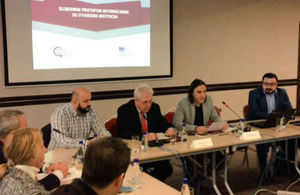“From access to information to open institutions” project in Montenegro
Steps forward in democratic governance, accountability and transparency.

Photo from final conference “From access to information to open institutions”
Since April 2014, the British Embassy Podgorica has been working together with NGO Centre for Democratic Transition (CDT) on a joint project, together with Montenegrin Agency for Personal Data Protection and Free Access to Information.
Background and aim of the project
The project aimed to enhance freedom of access to information through analysing the current status of legislation and its implementation in Montenegro, along with specific recommendations for more proactive publication. The final report was a peer-reviewed publication, comprised of:
- Comparative study of legislation and best practices,
- Montenegro data analysis,
- Policy study,
- A set of recommendations for decision makers and stakeholders.
The project tackled one of the most important laws related to Copenhagen criteria, the one whose improving is of fundamental importance for civil society – and to the public in general – as it represents the basis for all future policy making initiatives started within civil or private sector.
The project created a mechanism to monitor the implementation of Montenegro’s Freedom of Information Law, which can be incorporated into all public institutions. This will enable continued promotion of accountability and transparency, contributing to democratic governance through developing institutional and administrative capacity, and boosting civic engagement.
Final conference findings and results
The final report demonstrated significant increases in the amount of information proactively published by Montenegrin institutions, following targeted training, guidance and advocacy:
| Institution | % of required information now published | % of information published in April 2015 |
| Parliament | 100 | 99 |
| Prosecutor’s office | 99 | 4 |
| Government’s General Secretariat | 92 | 75 |
| Ministries | 81 | 54 |
| Independent administration authorities | 42 | 30 |
| Ministerial bodies | 26 | 20 |
| State University | 21 | no data |
The Montenegrin law prescribes that government and state websites are required to have information on:
- Public registries,
- Programmes and business plans,
- Business reports,
- Strategic documents,
- Drafts, proposals and final regulation texts,
- Bylaws and contracts on disbursement of finances,
- Lists of public officials and their monthly income,
- Lists of officials and their official titles,
- Decisions and other acts which are of significance to rights, duties and interests of third persons,
- Information which has been released under FOI.
Her Majesty’s Ambassador Ian Whitting said that these results were encouraging, and congratulated Parliament, Government and individual ministries on their progress.
I am pleased to see the general trend of positive results across institutions. While progress is not even, and there is always more to do, these steps forward are important. The proactive publishing of information not only meets citizens’ demands and enhances accountability mechanisms, it also reduces the amount of time required for individual free access to information requests. The positive examples presented here show what can be achieved with the right inputs and dedicated, and I look forward to seeing further positive results in this field.
For any questions about our project work in Podgorica, contact our Projects team.